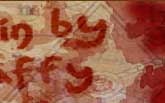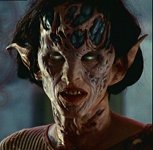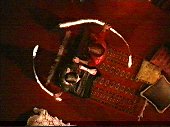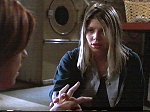|
||||
|
|
+THE DEMON VS. THE ROSE+ Season 6 references up to 6.11 'Gone' - you have been warned! A
BUFFYESQUE PERSPECTIVE
It has been made very clear where this comes from; in the Buffy mythology, using powerful magic means a person taps into the demon realms. All very powerful magic users in Buffy have been evil: the Mayor, Ethan Rayne, Rack. Willow is the only exception to this. It's hard to say whether the Mayor or Rack were once like Willow, but were corrupted by magic. With Ethan Rayne, however, we know a little more. In his Ripper days, Giles was like Rayne: young, foolish, looking to get power and thrills from demon possession. Giles got out, and left behind this kind of magic, but Rayne didn't. While once he and Giles had been friends (and therefore Rayne was presumably not evil), now he began to worship Chaos, in order to have access to greater power. Rayne was, to an extent, a pathetic figure, his life consumed by his magic. His entire raison d'être seemed to be to create chaos for Chaos. Amy in many ways mirrors both Rayne and Willow. Like Rayne, she treads a line between 'pranks' and real evil. But also like Rayne, Amy is at the mercy of the power she thought she was the mistress of. Like Rayne, Amy began her magic for her own amusement, for purely selfish motives: to cheat, to have power over others. But in 'Wrecked' it's clear that, pre-rat, she was no longer in control of this power. For those like Rayne and Amy, it's easy to become a slave to the dark power of magic. INTENT
IS EVERYTHING
In 'Something Blue', a grief-stricken Willow casts a spell to have her Will done, and make her wishes come true; she wishes Oz would come back to her. Giles is angered by this irresponsibility, pointing out that this is a very powerful spell. The spell works, but not in the way intended. The negative things which she wishes for come true, and she creates mayhem. The spell feeds off the dark energy and the negative motives. This dark power is enough to attract the demon world in the form of D'Hoffryn. A spell started with impure and self-centred intent goes wrong. Yet for the likes of Rayne, intent does not affect the spell. Rayne's spells are always done out of selfish intent, and while in 'Dark Days' he was forced to deal with the consequences of his magic, his spells still succeed. The difference is that Rayne's spells are dark, and he has no qualms about resorting to calling on evil deities. The darkness is where the true power lies: not just for Rayne, but the Mayor, Amy, Rack, Doc, Glory and Willow. The most powerful magics always come with a price: "That's the thing about magic. There are always consequences" says Spike in 'Consequences'. When Giles finds out Willow has called on Osiris to bring Buffy back, he identifies this power with evil: "Oh, there are others you can do what you did. You just wouldn't want to meet them". Willow has used true power, but only by consorting with true evil. NATURAL
VS. DEMONIC
Demonic magic is not the opposite of natural magic, but an extension of it. Natural magic works within the bounds of this reality, but demonic magic calls on other dimensions as a source of power. Rayne got his power from Chaos, and Amy seems to get much of hers from the Goddess Hecate. In Season Five, Doc worships Glory. The Mayor pays tribute to a variety of demons, and the lawyers at Wolfram and Hart (in 'Angel') draw their power from the demon dimension of the Senior Partners. Using scrolls and magic objects is a quick route to the demon realms; in natural magic, crystals, herbs and other plants are used to augment power. Motives are irrelevant to demonic magic; the demonic realms don't care about human moral quandaries. ESCAPISM
THROUGH POWER
Tara: When things go wrong you don't even consider the
options - you just do a spell.
Some characters in Buffy have greater magical grounding than others; Tara's ethics stem from practising Wicca from an early age. Giles, coming from a long line of Watchers, has a similar grounding. Willow, however, does not. The way Willow has progressed so fast in magic is a vulnerability for her; those practising natural magic have an understanding of the dangers of power, something Willow lacks. Equally Willow's power makes her more vulnerable; she draws the likes of D'Hoffryn and Rack to her, draws the attention of those practising dark, demonic magic who wish to use her power for their own gains or amusement. Giles and Tara are clearly not as gifted as Willow; but part of this is surely because they are, sensibly, limited by their ethics. For Willow, the combination of a great gift and a lack of knowledge about the dangers of magic is dangerous. Giles and Tara have tried to warn her, but either they have underestimated her power or overestimated her understanding of magic. When Giles calls Willow a 'rank amateur' he means that, in her quest to be better, she has disregarded the code of ethics Wiccans and Watchers live by. Yet Giles never really tried to impress his ethical code on Willow; I would argue that this is because he thought she was more responsible than she truly was: "she of the level head". Giles was blind to her vulnerabilities, and took her strength for granted. Tara, on the other hand, never saw Willow's "geekish roots"; she believed her to be a powerful and responsible person, completely in control. But Willow was only in control on the exterior, and still suffered from insecurities. In 'Something Blue', part of her motivation for wanting Oz back stemmed from her fear of becoming a 'nerd' again: "Hello! Dating a guitarist. At least I was..." The darkness Willow was drawing on fed on her insecurities and weaknesses. With Tara, Willow had someone who tried to teach her the boundaries between natural and demonic magic. Yet from the start Willow's own independence stopped her from listening to Tara, and she set herself on the path towards darkness: a path which, once embarked upon, is hard to leave. I don't think abandoning magic need be Willow's goal; all she need do is cast out the demon, and embrace the rose.
|






